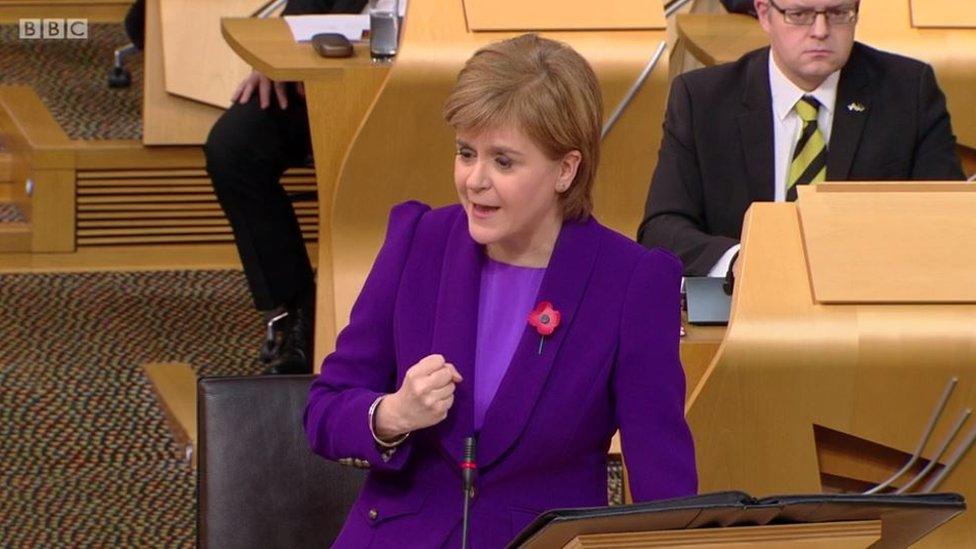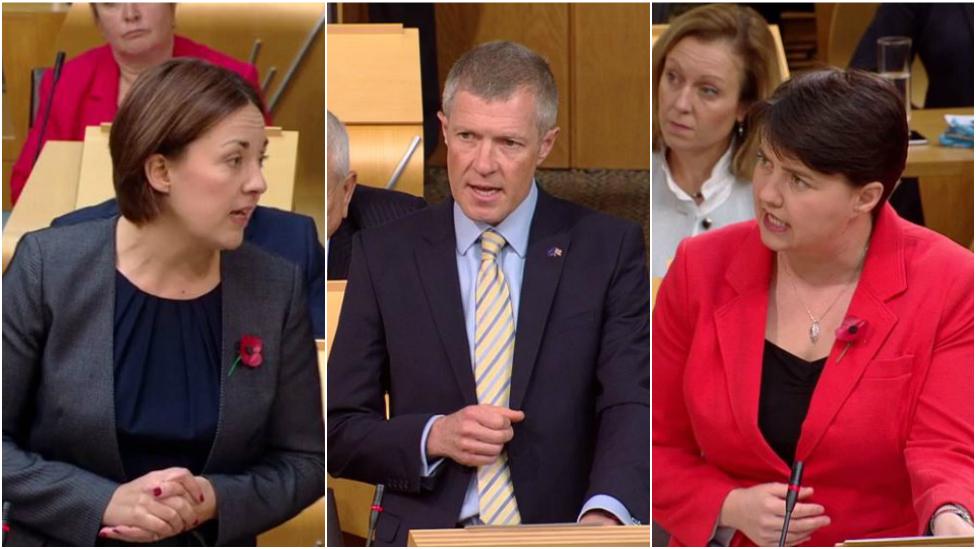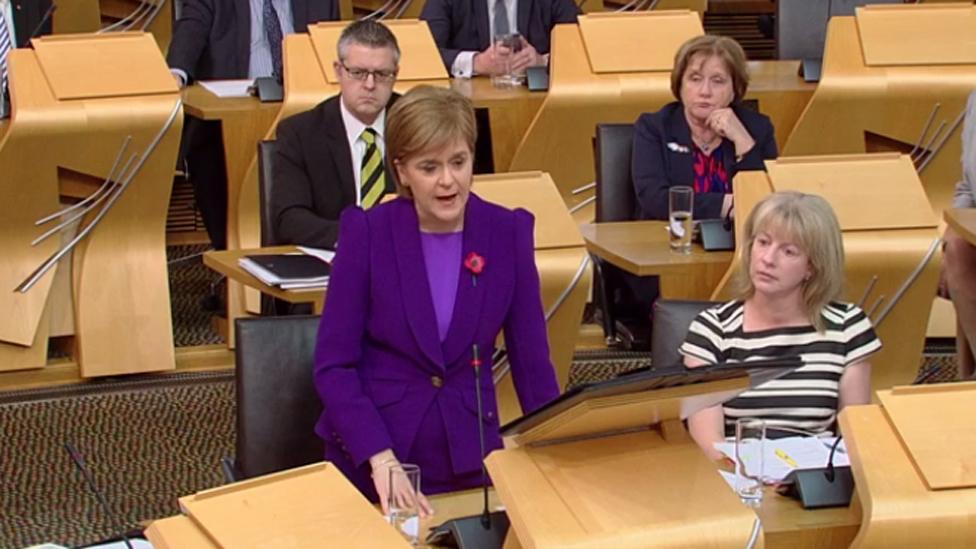The David Davis Hotline at first minister's questions
- Published

"Hello?" Is that the David Davis Hotline?"
"I'm sorry. Your call cannot be taken at the moment. The Secretary of State is busy trying to work out what Brexit means. Press one if you know the answer. Two if you don't. And zero if you just want to complain about the winner on Bake Off."
"Look, this is Mike Russell here. This is meant to be the Brexit Hotline. But I've been trying to get through for 36 hours!"
"Your call is important to us. Press one if……"
Cue sound of receiver being slammed down.
We've all been there, haven't we? That disembodied voice at the end of the line: irritatingly soothing and offering umpteen options which, without exception, never coincide remotely with the problem which prompted your call.
This time, according to Nicola Sturgeon, the unwilling victim was the Scottish government. The offer of a hotline to the Brexit Secretary was pretty much the only substantial item discerned by Scottish ministers from the talks in Downing Street on Monday.
And, again according to Ms Sturgeon, it's a dud. Mike Russell apparently tried repeatedly to contact the hotline. Without success.
I think I know why. The Department for Exiting the EU (Dexeu) might be uncertain as to what Brexit means - but my guess is they can set up a smart phone system. A cunning plan, if you like.
So, when Mike Russell or Nicola Sturgeon calls the line, their number and their designation flashes up on the Dexeu Batscanner. With a wry grin and perhaps even a faint chuckle, Mr Davis then turns to his Private Secretary, flicks a speck of dust from his immaculate cuff and declares: "Just let that one ring, eh?"

Nicola Sturgeon won laughs in the Holyrood chamber by satirising the Brexit Hotline
There are limits, though, and so Mr Russell eventually got through to Mr Davis. Was there clarity all round? An outbreak of consensus? Thought you might say that.
Satirising the hotline was an effective gag by the first minister. And she was on good form earlier too, answering questions about the health service. She had to be, given the relatively challenging nature of a report from Audit Scotland.
The financial watchdogs said, yes, there had been improvements and, yes, spending was at a record level. But the NHS was still struggling to cope with rising demand from an ageing population - and, indeed, had failed to meet a series of key waiting time targets.
Robust counter-attack
Entirely understandably, the opposition leaders seized upon this. There were cries of scandal. There were complaints that insufficient improvement had been discerned on the SNP's watch. There were demands for action.
It was noted, further, that the health secretary for most of the past decade had been one Sturgeon, N. So this, for the FM, was personal.
Did she crumble? Did she whimper? Did she plead for parliament's mercy? Did she say that a big boy done it and then ran away - to Westminster?
Friends, she did not. Ms Sturgeon opted for immediate and robust counter-attack, rather than timid defence. It was, on the day, in the chamber, effective. But the questions persist - and not just those validly and cogently posed by Ruth Davidson, Kezia Dugdale and Willie Rennie.

Opposition leaders pressed Nicola Sturgeon on the topic of health
How about this point, mentioned en passant by the first minister? If more money - much more money - doesn't appear to provide the complete answer, then are we asking the wrong question?
If targets are not being met, do we need simply to spend more money - or do we need to pose different targets? Or abandon targets altogether on the grounds that they may be too influential in driving clinical decisions?
Do we need to challenge more openly the nature of health and social care - for these are now integrated - rather than meekly accepting and funding the status quo ante?
We talk of an ageing population. This is, in itself, a good thing in that it means that the medical objective of sustaining life is succeeding.
We talk less of the nature of the health demands posed by such a population. Not a neat, tidy bundle of precise medical conditions, met with equal precision by carefully diagnosed care. Rather a complex multiplicity of problems - physical, social, psychological - which might or might not respond to hospital or clinical treatment.
To stress again. It is entirely right that the Scottish government's political opponents challenge the first minister about the current record. The Audit Scotland report has positive notes - but is very far from positive overall.
Those challenges today led to effective scrutiny of that current record - met by vigorous rebuttal from the FM.
However, perhaps the most intriguing comments in the chamber were with an eye to the future. They concerned the choices which may have to be faced if Scotland decides fully to enact plans to transfer care from hospitals to the community.
- Published27 October 2016

- Published27 October 2016
